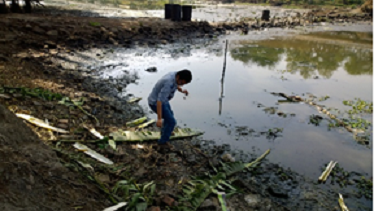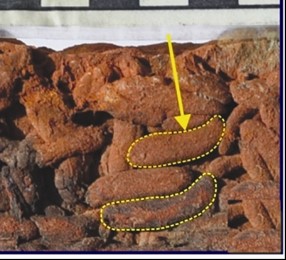
Collection of samples from Oil Refinery sludge deposition site
Living in areas around oil refineries is perceived to be hazardous to humans due to possible exposure to a group of compound called polycyclic aromatic hydrocarbons (PAHs). But a new study done around oil refineries in India claims that health risks posed by PAHs may be overstated.
This is because most parts of hydrocarbons are not bio-accessible - either they are not easily taken up by human body from the environment or cannot be utilized by human body. Although exposure to PAHs is believed to be a risk factor for cancer, these compounds bind with substances around them which limits their bio accessibility in environment. As they are not soluble in water their bioavailability, too, is limited.
Researchers from Indian Institute of Technology, Dhanbad, collected soil samples from distinct sludge deposition sites around oil refineries at Haldia (West Bengal), Barauni (Bihar) and Guwahati (Assam). Thirteen PAHs were extracted from the samples, and data was analyzed after comparing the soil samples with Polish standards for PAHs there are no Indian standards for PAHs in soil in India. The results of this study have been published in journal Science of the Total Environment.
"The risk associated with exposure to hydrocarbons has been traditionally hyped up (by almost three times) as earlier studies were done without the consideration of bio accessibility or bioavailability "
Though the entire study area fell in the ‘very heavily polluted site category’ (as the levels of the hydrocarbons were above the acceptable limits set by the Unites States Environmental Protection Agency), risk analysis done by the team has indicated that residents living near oil refinery sludge deposition sites fell in the ‘low risk zone for lifetime cancer’. This, researchers claim, indicates “the risk associated with exposure to hydrocarbons has been traditionally hyped up (by almost three times) as earlier studies were done without the consideration of bio accessibility or bioavailability”.
The risk analysis also showed that adults are exposed to hydrocarbons more and are therefore at a slightly higher risk than children. Exposure to hydrocarbons via the skin could be the main route of contact in adults and children, while the role of breathing contaminated air is insignificant. “This could indicate that there is an increase in cancer risk due to prolonged skin exposure for both children and adults and precautionary measures such as wearing maximum skin covering clothing may limit the hazard risk,” explained Dr. Alok Sinha, a member of the research team.
Polycyclic aromatic hydrocarbons occur naturally in coal, crude oil and natural gas. They are also produced when fossil fuels such as coal, oil, and gas are burned. Exposure can occur by breathing air contaminated by the chemicals, eating grilled foods such as meats or by touching these chemicals. After the polycyclic aromatic hydrocarbons are swallowed, breathed in or passed through the skin, the human body converts them into breakdown products called metabolites which have potential to bind with proteins and DNA, resulting in tumors and cancer.
The research team also included Dr. Abhhrajyoti Tarafdar from the Department of Environmental Science and Engineering, Indian Institute of Technology, Dhanbad. (India Science Wire)







